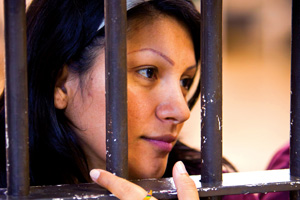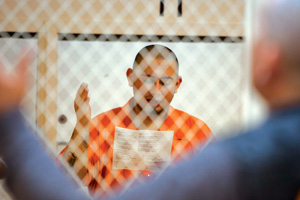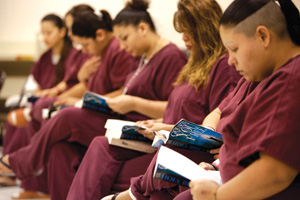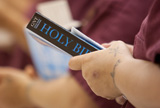Making the Soul Strong and Free

“ . . . you will know the truth, and the truth will set you free.” John 8.32 (GNT)
Her smile belies her bleak circumstances. Although she's in jail and cut off from her children, Katrina Ann Decker exudes a calmness and serenity, especially when she talks about the Word of God.
“The Bible means a lot to me,” she says. “When I'm sad, when I'm angry and when I'm depressed, I sit down and read it. It cleanses me. It washes the sadness, the anger and the depression right out of me. It makes me feel good every day. And at night, it makes me sleep like a baby.”
Stories like Decker's testify to the power of God's Word to bring hope and comfort to the lonely. They also reinforce the importance of God Sets You Free,™ American Bible Society's ministry to the incarcerated.
Begun nine years ago, God Sets You Free is a program in which ABS sends Bibles to U.S. inmates through a key partner and distributor, the Joplin, Mo.-based American Rehabilitation Ministries. Since the program began, ABS has put Bibles and New Testaments into the hands of more than 1 million inmates.
“We're in the business of restoring lives,” says Drew Segawa, manager of the God Sets You Free program. “We embody hope, especially for inmates.” But Segawa says our society doesn't care about these people. “We live in a culture that says ‘Lock them up and throw away the key.'”
This unrelenting view casts a cloud on the large number of incarcerated men and women. One in every 100 adults in the United States is behind bars, according to the Pew Center on the States. During the past 25 years, the number of prison and jail inmates has grown by 274 percent, bringing the total population in custody to 2.3 million.
Society may be happy to throw away the key on 2.3 million prisoners, but ABS can't for the simple reason that God doesn't.
That's why in places like the Cameron County Jail in Brownsville, Texas, God's Word is indeed active and alive — its transforming power changing the hearts and lives of even the hardest of criminals.
Filling the Broken Well
Ankles shackled, John Allen Rubio sits in an orange jailhouse jumpsuit, leafing through his annotated and highlighted Bible. Having spent four years in solitary confinement, Rubio has had plenty of time to pore over God's Word. And in the process, it has transformed his life.
“I have peace in my heart now,” he says, his face radiating joy when he speaks about the Bible. “I have a better relationship with people, with myself and with God.”
Rubio's favorite Bible story is that of the woman at the well. He relates to the story because he tried to fill the “broken well” of his life with things that could not sustain or satisfy. “No matter what I did, nothing could fill it,” he says. “When I read the Word, I feel full all the time.”
He realizes that being a Christian doesn't mean he won't suffer. He's now on death row for the murder of his three young children. He understands that he'll never be physically free, yet Rubio has a sense of hope because he knows “what's at the other end.”

Keeping Promises
Esequiel Silva, known among inmates as Chaplain Zeke, ministers to men like Rubio. In his work, Chaplain Zeke has seen God's Word change lives — including his own.
A self-described “full-blown drunk” by 18, Chaplain Zeke says he was a slave to addiction and all that came with it: lying, manipulating, deceiving. In and out of jail repeatedly, Chaplain Zeke would make promises only to break them because “everywhere I went,
I followed my same pattern.”
Chaplain Zeke lived this way for years, he says, until Jesus “finally called me by name and brought me to my knees.” At 35, Chaplain Zeke reformed his life and entered prison ministry by seeming happenstance: A fellow friend and prison chaplain asked him to translate prayer services for Spanish-speaking inmates.
In a turn of events, Chaplain Zeke's friend was involved in an accident that took him out of prison ministry for 18 months. Someone needed to fill in, and Chaplain Zeke stepped in. He hasn't left since.
Having worked at Cameron County Jail for several years, Chaplain Zeke says Bibles are a necessity here. Describing prison as a “pressure cooker,” he says aggression, hostility, devil worshipping and gang warfare characterize daily life.
God's Word offers a way out of hell for prisoners open to its life-changing message. “Having the opportunity for inmates to know
they can ask for a Bible or ask to see a minister relieves a lot of pressure
and stress,” says Chaplain Zeke.
Despite this, he emphasizes that prison ministry is anything but easy. “There aren't a whole lot of inmates saying ‘Alleluia' as you walk down the halls.” Nevertheless, he continues to preach about “repentance, love, forgiveness and the cross,” he says. “And you pray that God does what he does and he changes them.”

Free Indeed
Unfortunately, a high rate of recidivism is endemic to the prison population. Some reports, in fact, put the national recidivism rate at 60 percent. This reality underscores the need for Bibles in correctional facilities.
“Their families aren't supportive,” says Chaplain Patty Levsen, who ministers to the female inmates. “The only support they get is from all the wrong people, like gang members. The Bible gives them encouragement, and they come out with some hope that they can beat the odds and stay out of jail.”
Ismael Flores is committed to doing so. In an emotional interview, Flores says he had been locked up numerous times before he served his four-year sentence at Cameron. He's getting out soon and wants to finish parole, find a job and change the course of his life forever.
Crying as he talks, Flores says the Bible comforts and fills him with hope. Although he speaks in broken English, his words are eloquent: “The Bible makes my soul strong and free.”
Thanks to the support of our faithful financial partners, American Bible Society has been engaging people with the life-changing message of God’s Word for more than 200 years.
Help us share God's Word where needed most.
Sign up to stay in touch with how God is changing lives with his Word!









